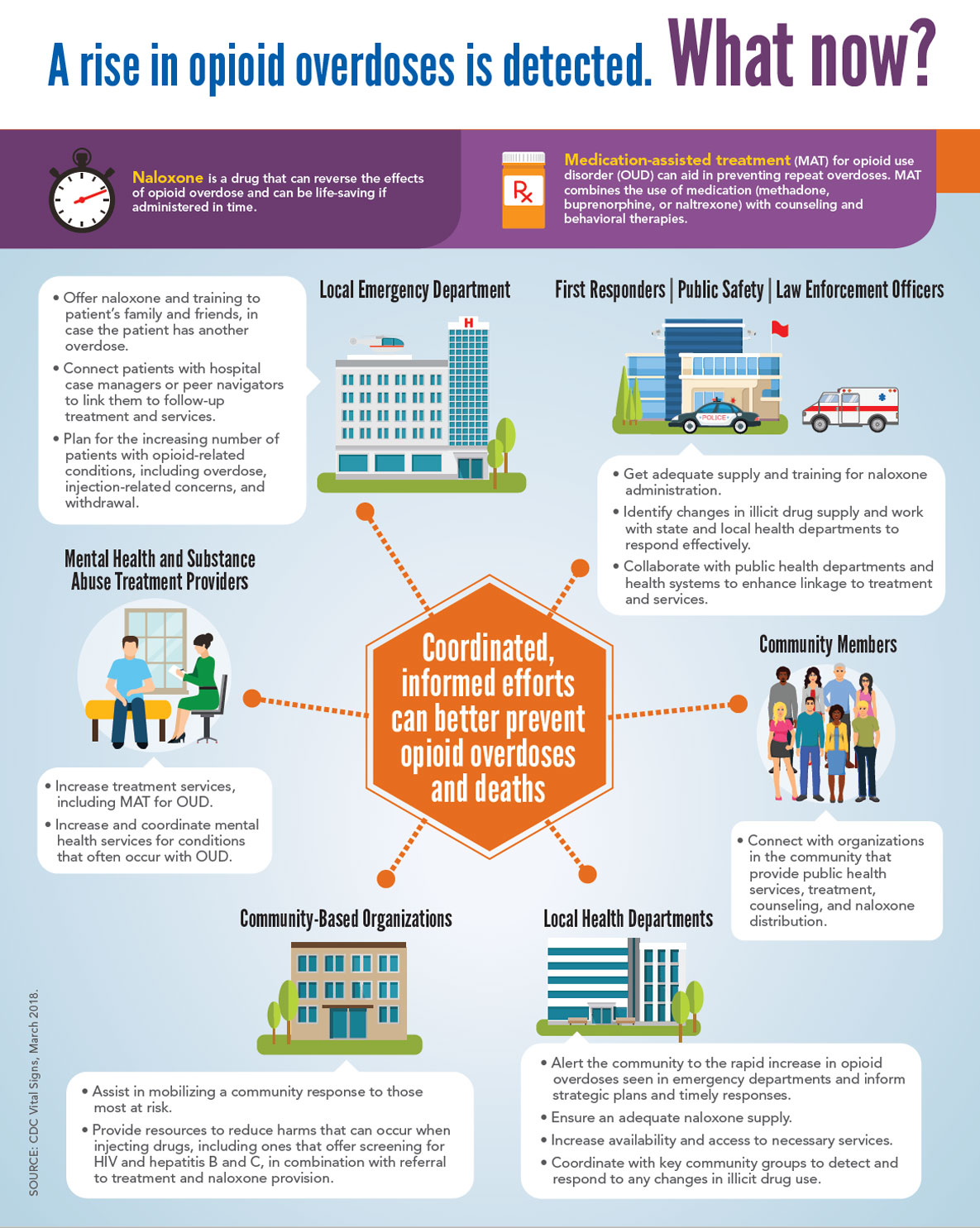A Rise in Opioid Overdoses Is Detected. What Now?: CDC Vital Signs: March 6, 2018
Supporting Files
Public Domain
-
March 6, 2018
-
Series: Vital Signs
File Language:
English

Details
-
Corporate Authors:
-
Description:Naloxone is a drug that can reverse the effects of opioid overdose and can be life-saving if administered in time.
Medication-assisted treatment (MAT) for opioid use disorder (OUD) can aid in preventing repeat overdoses. MAT combines the use of medication (methadone, buprenorphine, or naltrexone) with counseling and behavioral therapies.
Coordinated, informed efforts can better prevent opioid overdoses and deaths
Local Emergency Department
• Offer naloxone and training to patient’s family and friends, in case the patient has another overdose.
• Connect patients with hospital case managers or peer navigators to link them to follow-up treatment and services.
• Plan for the increasing number of patients with opioid-related conditions, including overdose, injection-related concerns, and withdrawal.
First Responders | Public Safety | Law Enforcement Officers
• Get adequate supply and training for naloxone administration.
• Identify changes in illicit drug supply and work with state and local health departments to respond effectively.
• Collaborate with public health departments and health systems to enhance linkage to treatment and services.
Mental Health and Substance Abuse Treatment Providers
• Increase treatment services, including MAT for OUD.
• Increase and coordinate mental health services for conditions that often occur with OUD.
Community Members
• Connect with organizations in the community that provide public health services, treatment, counseling, and naloxone distribution.
Community-Based Organizations
• Assist in mobilizing a community response to those most at risk.
• Provide resources to reduce harms that can occur when injecting drugs, including ones that offer screening for HIV and hepatitis B and C, in combination with referral to treatment and naloxone provision.
Local Health Departments
• Alert the community to the rapid increase in opioid overdoses seen in emergency departments and inform strategic plans and timely responses.
• Ensure an adequate naloxone supply.
SOURCE: CDC Vital Signs, March 2018
vs-0318-opioid-overdoses-1185px-3.jpg
-
Subjects:
-
Series:
-
Document Type:
-
Genre:
-
Pages in Document:1 poster
-
Collection(s):
-
Main Document Checksum:urn:sha-512:2ff6567a187c3170fe3a6332722fa3e2f65cf67e69a32e82eb37110e7a2b04637eb64f262236ad6fa42e2c0c5c0d24045bfa49296f2dbba09b61fd0a94f36ba8
-
Download URL:
-
File Type:
Supporting Files
Related Documents

File Language:
English
ON THIS PAGE
CDC STACKS serves as an archival repository of CDC-published products including
scientific findings,
journal articles, guidelines, recommendations, or other public health information authored or
co-authored by CDC or funded partners.
As a repository, CDC STACKS retains documents in their original published format to ensure public access to scientific information.
As a repository, CDC STACKS retains documents in their original published format to ensure public access to scientific information.
You May Also Like
COLLECTION
Stephen B. Thacker CDC Library


